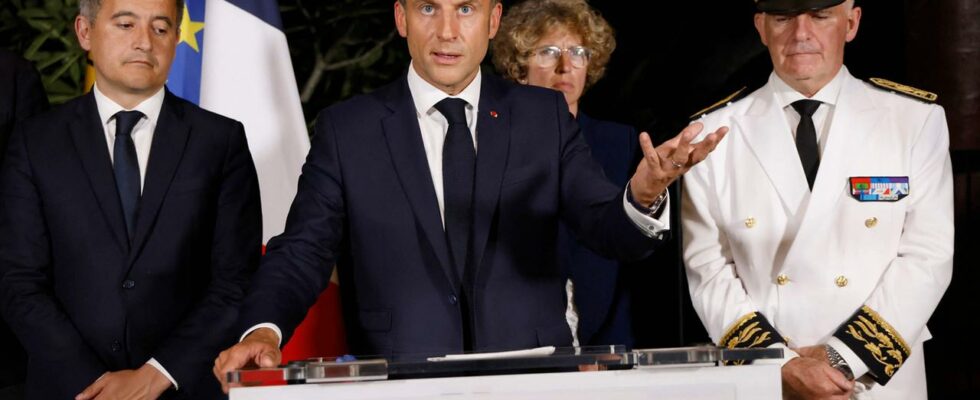In New Caledonia, which has been shaken by serious unrest, French President Macron spoke to the parties to the conflict. He made it clear that the violence had to stop – and brought another referendum into play.
French President Emmanuel Macron has spoken of an unprecedented uprising in New Caledonia. To calm the waters, he met with supporters and opponents of New Caledonia’s independence in the capital Nouméa. He suggested another referendum on the future of the French overseas territory.
He will also not exert pressure for electoral reform, which representatives of the indigenous Kanak ethnic group reject as a disadvantage, Macron said, calling on local leaders to use their influence to help restore order.
All attacks must be stopped
“Everyone has a responsibility to really call for the lifting of the barricades and an end to all forms of attacks, not just calm,” Macron said. He opened the meeting with a minute’s silence for the six people who died in shootings, including two gendarmes. The state of emergency imposed by the government in Paris on May 15 for at least 12 days could only be lifted if local leaders called for the barricades to be removed, he said.
Macron continued: “I have promised that this reform will not be imposed by force in the current circumstances and that we will give ourselves a few weeks to allow calm and the resumption of dialogue with a view to a comprehensive agreement.”
Allow time for a new agreement
He wants to give local leaders time to reach a new agreement on the future of New Caledonia. If they can reach an agreement, barricades are removed, the state of emergency is lifted and peace is restored, there could be a new referendum on the agreement.
Macron has previously mediated between supporters and opponents of independence in New Caledonia. The efforts culminated in three referendums in which the majority of New Caledonians voted to remain part of France, with the last vote being boycotted by the independence movement.
Electoral reform is rejected by some
The background to the current violence is an electoral law reform pushed forward by the French government, which supporters of independence for the overseas territory reject. They criticize that by expanding the number of eligible voters in New Caledonia, those politicians who support remaining part of France would be favored in elections and the Kanak candidates would be disadvantaged.
According to French authorities, more than 280 people have been arrested since violence first flared up on May 13. Barricades of burned vehicles and other debris have turned parts of Noumea into exclusion zones, making travel dangerous. The situation is critical for sick people in need of medical treatment and for people in need of food and water after shops were looted and set on fire.
“Nobody expected this level of violence”
With his 16,000 kilometer journey, Macron made it clear how important the archipelago east of Australia is to him. He was accompanied by Interior Minister Gérald Darmanin and Defense Minister Sébastien Lecornu.
When they arrived in Nouméa, the unrest was still simmering – despite a nightly curfew and 3,000 police and gendarmerie reinforcements. “These forces will remain as long as it is necessary, including during the Olympics and Paralympics,” which begin on July 26 in Paris, Macron said. Asked whether he thought a 12-hour visit to New Caledonia would be enough, Macron replied: “We’ll see. I have no limit.” Later, at Nouméa’s central police station, he thanked officers for their work and said: “Nobody expected this level of violence.”
With information from Stefanie Markert, ARD Studio Paris.
Stefanie Markert, tagesschau, 23.05.2024 17:11

